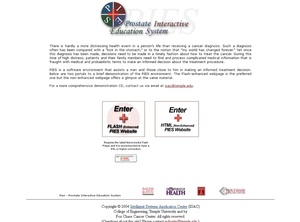Prostate Interactive Educational System (PIES)

- Description:
PIES provides an interactive virtual health centre, designed to provide information for individuals diagnosed with prostate cancer and assist with the treatment decision process. You can visit the various parts of the health centre: the information desk, physicians, the library and the support groups - navigating between the main lobby and the different rooms. The physicians are represented as videos answering questions on a series of topics related to prostate cancer. In the library you can access interactive information about treatment options and side-effects and in the support group room listen to discussions among groups of individuals who have experienced prostate cancer. The program aims to encourage you to follow a logical decision making process when considering your different treatment options and address the emotional aspects of a prostate cancer diagnosis.
- Service URL:
- http://www.temple.edu/imits/pies.htm
- Agency Responsible:
- Mount Sinai School of Medicine and Temple University.
Details
- Format:
- Website.
- Intervention Type:
- Educational (primarily educational material or psychoeducation). And self-regulation
- Course Length:
- Long (more than 5 modules).
- Support Option:
- Program guidance.
Target Audience
- Primary Category:
- Physical Health. Prostate Cancer
- Target Audience:
- Adult. Males diagnosed with prostate cancer
- Language:
- English.
Access
- Fee:
- Free.
- Access:
- Open: No registration required. The program is also available as a CD ROM
- Contact Details:
Research evidence
- Research Trials:
- 1
- Research RCTs:
- 0
- Outcome Summary:
The effectiveness of the PIES intervention has been examined in a controlled study. This study was also interested in determining the impact of including tailored information in the library targeted at participants' ‘monitoring-style' (with a 'high-monitoring' style indicating an increased need for information and a 'low-monitoring' style indicating a reduced need for information). Participants were randomised to 3 conditions - PIES intervention with tailored information, PIES without tailored information or a control condition with elements of usual care. Although there was no difference between the two intervention-conditions, participants in the two PIES groups were significantly more confident about their treatment preferences and significantly less likely to report that they needed more information to make a decision than participants in the control group. Participants in the intervention groups also indicated that they would need less time to deliberate their treatment options and felt better informed about their choices and potential side effects. However, a further randomised trial including a non-active control is needed to improve the program's rating.
- Recommended rating, reviewer 1:

- Recommended rating, reviewer 2:

Read more about Beacon's Smiley Rating System.
Research paper citations
Evaluation evidence studies:
Diefenbach, M. A. et al (2012) Acceptability and preliminary feasibility of an internet/CD-ROM-based education and decision program for early-stage prostate cancer patients: randomized pilot study. Journal of Medical Internet Research. 14(1): e6
Additional reference:
Diefenbach, M.A. and Butz, B.P. (2004)A multimedia interactive education system for prostate cancer patients: development and preliminary evaluation. Journal of Medical Internet Research. 6(1), e3
User ratings
User ratings and comments are moderated in order to assure the quality of the submissions. It might take a week for your rating to show up.
Your rating
Login to rate this service.
Other user ratings
No ratings for this service yet.
Last Updated: December 10th 2012

 Home
Home
 Categories
Categories Physical Health
Physical Health